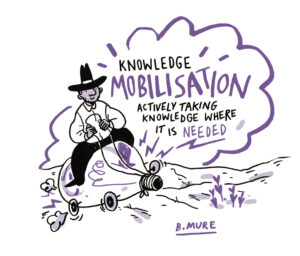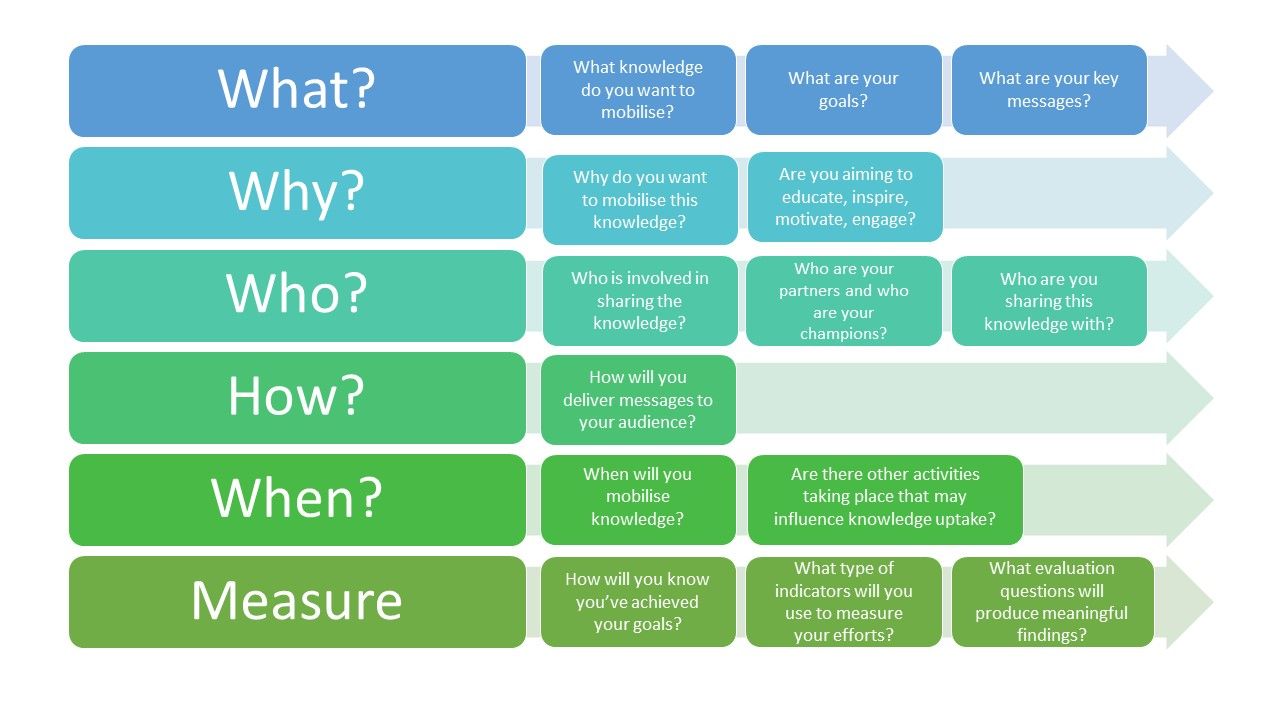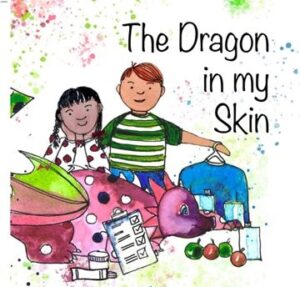During October, EBN will be bringing you a series of Blogs on Knowledge Mobilisation and other approaches to implement research into practice. Our first Blog asks, ‘What is Knowledge Mobilisation?’ and then provides an example of how this approach can be applied.
Fiona Cowdell is a Professor of Nursing and Health Research at Birmingham City University and a National Institute for Health Research Knowledge Mobilisation Research Fellowship alumna.
What is knowledge mobilisation?

- Mobilising knowledge across communities to create impact in the real world. [1]
- Making evidence accessible, understandable and useful for knowledge users. [2]
- The reciprocal and complementary flow and uptake of research knowledge between researchers, knowledge brokers and knowledge users …. in such a way that may benefit users and create positive impacts. [3]
Why should we mobilise knowledge?
- Research findings still take on average 17 years to change practice
- Research is expensive (MRC spend 2017-8 ~ £814m and NIHR 2020-21 ~ £480m) and is often wasted
- We have a professional and social responsibility to ensure that research findings are moved to where they are most useful and improve patient care
There are many tools and frameworks for KMb. Key considerations for planning KMb adapted from the Ontario Centre of Excellence for Child and Youth Mental Health offer a useful starting point1
A practical example from the world of dermatology
Things we know
- Eczema affects around 20% of children in the UK and impacts on wellbeing and quality of life
- Evidence based guidance on eczema care is freely available Eczema – atopic | Health topics A to Z | CKS | NICE
- An eczema mantra is “get control-keep control” through use of topical corticosteroids when needed and regular and consistent application of emollients
- But …… this often doesn’t happen in practice for multiple reasons
Five co-created messages
Parents, practitioners and researchers co-created five simple, evidence-based messages designed to be delivered to parents, practitioners and the wider community with the aim of increasing shared language and understanding and so improve care.
- Eczema is more than just dry skin
- Eczema doesn’t just go away
- Moisturisers are for every day
- Steroid creams are okay when you need them
- You know your child’s eczema best.
One focus was on getting the messages to children, to plan this we worked through the knowledge mobilisation framework.
Applying the knowledge mobilisation framework to eczema care
What?
- What knowledge: Eczema needs to be looked after every day and there are special creams for when it is most sore.
- Goals: For children and parents to understand and practice best eczema care.
- Key messages: You need to use moisturisers every day, steroid creams are okay when your skin is getting worse. You need to look after your skin.
Why?
- Why mobilise: Help children and parents care for eczema more effectively.
- Aim: Educate and motivate change in eczema care practice.
Who?
- Sharing knowledge: Knowledge mobiliser, writer and illustrator.
- Partners and champions: Parents and teachers.
- Recipients: Children, parents and teachers.
How?
- How: In a story book and teacher resource pack.
When?
- When: From now.
- Other linked activities: National Eczema week.
Measure
- Goal achievement: Children enjoy the book and understand more about how to care for their skin.
- Indicators: Qualitative feedback, quantitative eczema severity measures.
- Evaluation questions: What did you learn from the book? How are you getting on with eczema care? Is your skin more comfortable? Is your eczema less severe? Are you having fewer flares? (answered by children or parents). Was the teacher resource useful? What impact did the resource have?
How did we share messages with children?
We created this book, if you follow the link you can see how we have embedded the five key messages into content that is meaningful for children The Dragon In My Skin. We also developed a teacher resource pack based on the Dragon story Dragon resources.
Early evaluation examples
- Hard copies distributed to primary schools (n=792) with links to all other Dragon resources. Over 200 further copies sent on request to teachers, parents and practitioners.
- “superb, I love the story and the pictures, what a lovely way for children with eczema to be able to see how they can tame their dragon and to have its impact validated in such a wonderful way!” [parent]
- “It’s beautiful. And as someone with a dragon since day one in life and struggling at the moment with it, I was especially moved by this.” [teacher]
- “loved the way you haven’t shied away from the difficult and painful experiences and feelings children have about eczema” [charitable organisation]
- “[child’s name] wanted me to tell you that she has put her spray on all over to look after her dragon” [parent]
- “The children had some really mature discussion during this lesson and I have to say I was impressed, a couple of children with eczema were heavily involved in this and told other pupils some of their experiences (without being prompted or pressured to do so)” [teacher]
Knowledge mobilisation is: Mobilising knowledge across communities to create impact in the real world
Where to get more information
- Ontario Centre of Excellence for Child and Youth Mental Health. http://www.kmbtoolkit.ca/planning
- Knowledge Mobilisation Alliance, a coalition of NIHR Knowledge Mobilisation Research Fellows (https://www.nihr.ac.uk/documents/knowledge-mobilisation-research/22598)
- NHS HEE Resources for NHS Knowledge Mobilisation Framework E-Learning. https://www.e-lfh.org.uk/programmes/knowledge-mobilisation-framework
- fiona.cowdell@bcu.ac.uk
[2] http://www.kmbtoolkit.ca/what-is-kmb
[3] https://www.sshrc-crsh.gc.ca/funding-financement/programs-programmes/definitions-eng.aspx#km-mc
Disclaimer and source of support:
This report is independent research arising from a Knowledge Mobilisation Research Fellowship, Professor Fiona Cowdell, KMRF-2015-04-004 supported by the National Institute for Health Research. The views expressed in this blog are those of the authors and not necessarily those of the NHS, the National Institute for Health Research, Health Education England or the Department of Health.


